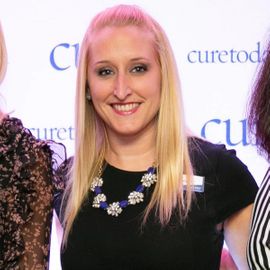- About Us
- Advertise / Support
- Editorial Board
- Contact Us
- CancerNetwork.com
- TargetedOnc.com
- OncLive.com
- OncNursingNews.com
- Terms & Conditions
- Privacy
- Do Not Sell My Information
- Washington My Health My Data
© 2025 MJH Life Sciences™ and CURE - Oncology & Cancer News for Patients & Caregivers. All rights reserved.
Disparities in von Hippel-Lindau Disease

Kristie L. Kahl is vice president of content at MJH Life Sciences, overseeing CURE®, CancerNetwork®, the journal ONCOLOGY, Targeted Oncology, and Urology Times®. She has been with the company since November 2017.
CURE spoke with Stacy Lloyd, board member of the VHL Alliance, about disparities seen in VHL and its patient population.
Kristie L. Kahl: What are the current challenges that we see in VHL?
Stacy Lloyd: There is a lack of awareness and knowledge about the disease in general. So definitely a critical need to reach, educate, support the diagnosed and undiagnosed VHL patients, all but also, especially those in underrepresented and marginalized communities. Another one of our biggest challenges, and it is sometimes hard to reach, those patient populations, we don't really have any great source of data to understand our full VHL patient population and how to diagnosis and treat may vary across those different patient demographics or social determinants of health.
Kristie L. Kahl: What are we doing to hopefully address these challenges that we're seeing?
Stacy Lloyd: As an organization, the VHL alliance is participating in diversity, equity and inclusion training, and getting really intentional about our commitment to it internally. And we're also just really beginning with ROI as it relates to the mission of the Alliance and we are dedicated to research, education, support, to improve awareness, diagnosis, treatment and quality of life for those affected with VHL. And that includes all patients affected by VHL. So we're in the infancy of this journey, I would say, but as we become more educated and equipped as an organization, and as a group of advocates, I would say, we can employ the use of tactical steps to hopefully help us reach and better serve the broader VHL community.
Kristie L. Kahl: How does equity and inclusion play a role in VHL and its diagnosis?
Stacy Lloyd: Diversity, equity and inclusion play a similar role in the world of VHL as it does in health care overall, and really in general. We know that historically marginalized and minoritized populations have a very different experience with the health care system. Many don't have access to quality care for various reasons, whether that be a geographical location, issue of lack of insurance, but also, there's a lot of mistrust in the health care system and under representation and in diverse health care providers in the medical field that can contribute to bias and a lack of cultural humility, which makes it not always the easiest for certain patient populations to even go see the doctor or want to go see the doctor.
So, as an organization in a group of advocates that works closely with patients, families and medical professionals, we do have a role to play and moving forward in health care overall.
Kristie L. Kahl: How can we try to raise more awareness about this issue moving forward?
Stacy Lloyd: One of the major first steps has been to verbalize our commitment as an organization to diversity, equity and inclusion. We did that in June of 2020, and have continued to really take steps to educate ourselves as a group. We're also working to identify the needs of our patient population, to enhance our support, not only for racially ethnically diverse patients, but also have a pretty decent size patient population that has encountered physical disabilities as well.
The tumors in the eyes can cause low or no vision. The tumors in the inner ears also can cause hearing problems. And then, of course, just knowing that we have tumors in the brain, the spine and other areas of the body, the number of surgeries that someone may have to encounter over the course of their lifetime, also cause mobility issues over time, as well. So, you know, we really want to work to understand the needs of all of our patients so that we can engage in advocacy efforts, which is really another way to create awareness, so that we ensure that we have that diverse voice of the VHL patient in the right spaces to make a difference. And finally, I really look at us, like I said, as advocates for health equity and literacy, which hopefully will enable us to address the needs of all of our VHL patients, regardless of their access to health care, their access to technology, transportation and all of those other things that can contribute tto a patient's ability to get the care that they need.
Kristie L. Kahl: If somebody does want to get involved and become an advocate, what is the best way for them to go about doing that?
Stacy Lloyd: Sure, they can go to the VHL Alliance’s website, it's VHLl.org. There are ways that they can reach out to us, email and send us a note. We're always open and looking for folks that want to be involved in the work that we're doing. If you're a VHL patient, we want to make sure we are supporting you and your family. There's lots of resources there that that we didn't get to touch on today. So please check that out. And we look forward to hearing from you.
Related Content:



